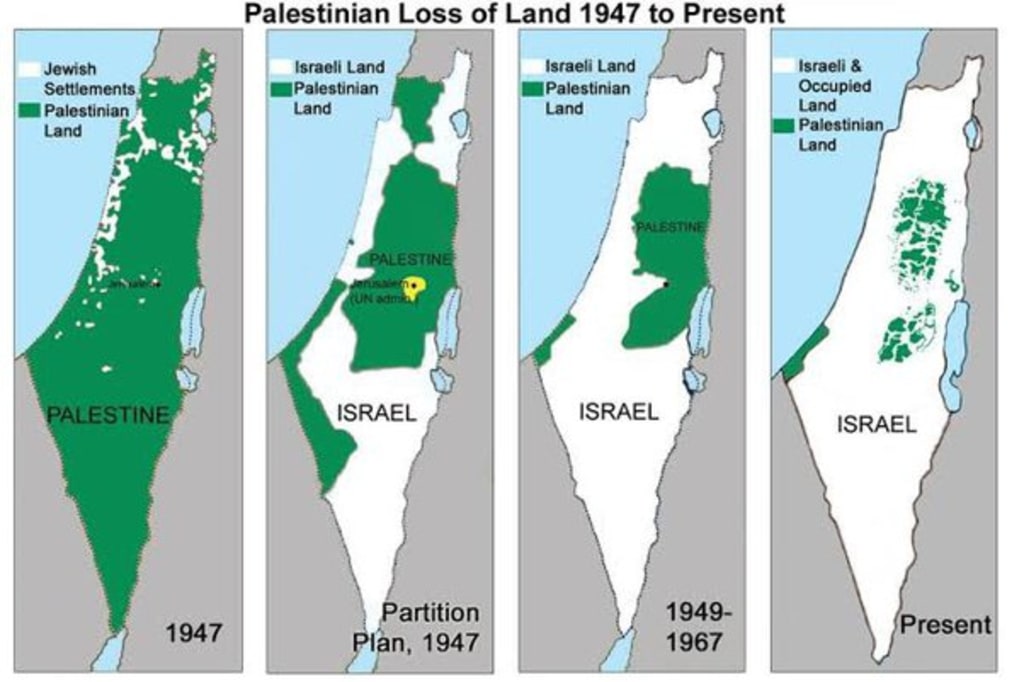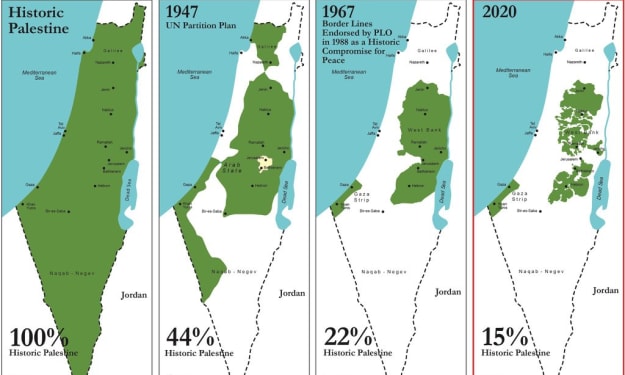The establishment of the illegal state of Israel
illegal state of Israel

The term "Occupied State of Israel" is not a recognized or commonly used term in international or historical contexts. However, it appears that you might be referring to the establishment of the modern state of Israel and the subsequent territorial issues and conflicts that have arisen in the region.
**The Establishment of the State of Israel:**
The modern State of Israel was established on May 14, 1948. This event marked a significant turning point in the history of the Middle East, with profound implications for both regional and international politics. The establishment of Israel came after decades of political, social, and historical developments, and it was accompanied by a complex web of regional and global factors.
The roots of the modern State of Israel can be traced back to the late 19th and early 20th centuries when a movement known as political Zionism emerged. The goal of Zionism was to establish a homeland for Jewish people in their historic homeland, which they viewed as the biblical land of Israel. The Zionist movement gained momentum over the years, as Jews from around the world sought refuge and self-determination in a land they considered their ancestral home.
The British Mandate for Palestine, established after World War I, played a pivotal role in shaping the events that led to the creation of Israel. The Balfour Declaration of 1917, in which the British government expressed support for the establishment of a "national home for the Jewish people" in Palestine, marked a significant turning point. However, the declaration also included a clause emphasizing that "nothing shall be done which may prejudice the civil and religious rights of existing non-Jewish communities in Palestine." This clause would become a source of tension and conflict in the years to come.
As Jewish immigration to Palestine increased, so did tensions between Jewish and Arab communities. Arab Palestinians, who had long inhabited the region, were deeply opposed to the Zionist project and the influx of Jewish immigrants. This led to a series of clashes and violent conflicts between the two communities.
**United Nations Partition Plan and the First Arab-Israeli War:**
In 1947, the United Nations proposed a partition plan for Palestine, which recommended the division of the territory into separate Jewish and Arab states, with Jerusalem as an international city. The plan was accepted by the Jewish leadership but rejected by the Arab states and Palestinian Arab leadership. Despite objections, the United Nations General Assembly passed the partition plan, and this laid the foundation for the establishment of the State of Israel.
On May 14, 1948, David Ben-Gurion, the head of the Jewish Agency, declared the establishment of the State of Israel. This declaration was met with jubilation by Jewish communities around the world. However, it also triggered a military response from neighboring Arab states, including Egypt, Jordan, Syria, and Iraq. The first Arab-Israeli war (1948-1949) ensued.
The war resulted in significant territorial changes from what was originally envisioned in the UN partition plan. When the armistice agreements were signed in 1949, Israel had gained control over a larger portion of territory than had been allocated to it in the UN plan. The West Bank came under Jordanian control, and the Gaza Strip fell under Egyptian control. The city of Jerusalem was divided, with the western part under Israeli control and the eastern part, including the Old City, under Jordanian control.
**The Occupation of the West Bank, Gaza Strip, and East Jerusalem:**
The term "Occupied Territories" has been widely used to describe the West Bank, Gaza Strip, and East Jerusalem since their capture by Israel during the Six-Day War in 1967. This war was a result of rising tensions and conflicts between Israel and its neighboring states, including Egypt, Jordan, and Syria. Israel's pre-emptive strike in June 1967 led to its military occupation of these territories. The status of these areas remains a source of ongoing international dispute and contention.
The use of the term "Occupied Territories" is based on the premise that Israel's presence in these areas is not recognized as legitimate by the international community. Many countries, including the United Nations, have passed resolutions denouncing Israel's occupation and calling for its withdrawal from these territories. However, Israel disputes this characterization, arguing that the territories are disputed rather than occupied.
The situation in the West Bank and Gaza Strip is complex. The Palestinian population in these areas has lived under Israeli military rule, with Israel exercising control over security, infrastructure, and administration. Israel has also established settlements in the West Bank, which are considered illegal under international law. The presence of these settlements, along with the construction of a separation barrier, has added further complexity to the situation.
East Jerusalem, which includes the Old City, holds particular significance. Israel unilaterally annexed East Jerusalem following the Six-Day War, a move that is not recognized by the international community. Both Israelis and Palestinians lay claim to Jerusalem as their capital, and its status remains a deeply contentious issue in the Israeli-Palestinian conflict.
**The Israeli-Palestinian Conflict:**
The Israeli-Palestinian conflict is one of the most protracted and complex conflicts in the world. It is rooted in historical, religious, and nationalist narratives, as well as deeply held grievances on both sides. The core issue is the competing national aspirations of Israelis and Palestinians, with both seeking self-determination and statehood.
Numerous attempts have been made to negotiate a peaceful resolution to the conflict, with a two-state solution being a widely accepted framework. This solution envisions an independent Palestinian state living side by side with Israel. However, reaching a final status agreement has proven elusive, as it involves addressing key issues such as borders, settlements, the status of Jerusalem, security, and the rights of Palestinian refugees.
The situation is further complicated by extremist elements, violence, and a lack of trust between the parties. The conflict has resulted in loss of life, suffering, and instability in the region. International efforts, including those by the United States, European Union, and the United Nations, have been made to mediate and facilitate negotiations, but a comprehensive peace agreement remains elusive.
In recent years, there have been renewed efforts to revitalize the peace process. While some progress has been made, significant challenges and obstacles persist. The Israeli-Palestinian conflict remains a central issue in the broader Israeli-Arab conflict, and its resolution continues to be a pressing concern for regional stability and international diplomacy.
In conclusion, the establishment of the modern State of Israel in 1948 was a significant event in the history of the Middle East, marked by complex historical, political, and territorial developments. The Israeli-Palestinian conflict, along with the issue of the occupied territories, has remained a contentious and unresolved issue for decades. The quest for a peaceful resolution continues to be a central challenge in the region, with the two-state solution as the widely recognized framework for achieving a lasting and just settlement to the conflict.
About the Creator
Abdullah Rajon
Experienced content writer skilled in SEO optimization, research, and deadline-driven delivery. Let's create engaging content together!






Comments (1)
We stand with innocent humans who are under attack.